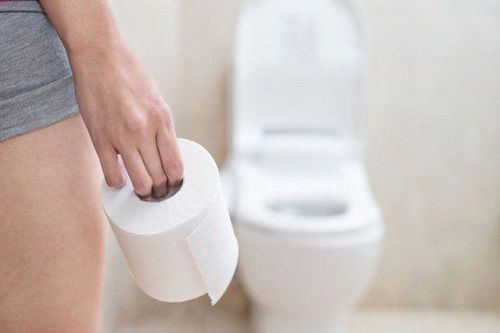This is an automatically translated article.
The article was professionally consulted with Specialist Doctor I Le Nguyen Hong Tram - Gastroenterologist - Department of Medical Examination & Internal Medicine - Vinmec Nha Trang International General Hospital.1. What is normal defecation?
How to go to the toilet is normal is a common question of many people. To evaluate that, we need to rely on bowel habits and the nature of stools.1.1. The habit of defecating
Defecation is the elimination of waste from the body through the digestive tract. The bowel habits of each person are not the same, some people defecate every day but also some people only a few times a week.The number of bowel movements and the number of stools excreted each time depends on the diet, the body, the intestinal flora and living habits. Genes and the amount of fiber in the daily diet greatly affect the frequency of bowel movements. According to the recommendation, the recommended amount of fiber per day for men is 38 grams and women need 25 grams.
So, how often is it normal to have a bowel movement? The most common frequency of defecation is once a day. There are people who defecate more - about 2-3 times / day, or less - about 3-4 times / week is still considered normal. If your bowel movements are more or less than the numbers above and it's been going on for a long time, there's a good chance your digestive system has a problem.
1.2. Fecal properties
In normal people, stools are tubular like sausages, soft, not hard, smooth surface, not strong smell. Stools can be rough or fissured when the diet lacks water and fiber.Stools are usually dark brown or yellow-brown. The color of stool can also change depending on the food and medicine.

2. Abnormal signs when defecating
Recognizing abnormal signs when defecating is necessary so that we can detect diseases in the digestive system early and treat them promptly. If the change persists for more than a week, you should see your doctor.2.1. Change in frequency of defecation
If you have a bowel movement more than 3 times a day, you may have diarrhea. Besides, it is unusual to have a bowel movement more than 3 days only. Stool stagnation in the colon for too long will lead to many problems such as hemorrhoids, constipation, bloody diarrhea, intestinal obstruction, ...2.2. Change in stool properties
Hard stools, small, have to push to push out: That means you are constipated. The most common cause is not enough water and fiber in the diet. Add more fruits, vegetables, nuts and seeds to your menu. Stools that are black like tarry or bright red: you have gastrointestinal bleeding. You should see a doctor as soon as you notice blood in the toilet bowl. Some medicines that contain bismuth can also turn stools black, but this should go away when the medicine is stopped. Loose stools but not diarrhea: Celiac disease. Accordingly, people with this disease are unable to absorb gluten (proteins in wheat, barley). When eating foods containing gluten, the immune system destroys the microvilli in the small intestine, preventing the body from absorbing nutrients from the food. Patients may experience loose stools and bowel movements several times a day. Stool floats instead of sinks: the digestive tract is bloated. This is normal if you eat a lot of beans, sprouts, cabbage or a hearty meal. However, if this occurs frequently and you see oily scum with stools, it is likely that you have pancreatitis or an infection. As a result, the patient has a reduced ability to produce fat-digesting enzymes or the intestinal mucosa is damaged leading to malabsorption. Liquid stool with sulfur smell, rotten egg smell: Giardia infection. Giardia parasites are usually found in natural water. Patients can be infected with Giardia if they swim in lakes, rivers, go camping or drink undercooked water. Patients may have loose stools that last for weeks to months but still feel well. To confirm the diagnosis of this disease, a stool sample is required. Small, pencil-like stools: constipation or rectal cancer. Constipation can cause flattening but only for a short time and is improved when you eat more fiber and drink lots of water. If this condition persists for months and the stools get smaller and smaller, it could be a sign of rectal cancer. The tumor takes up space in the rectum, leaving the stool without space to form as it should. Loose and seaweed-colored stools: Clostridium difficile infection. Common after a long time using antibiotics, disrupting the balance of bacteria in the intestinal tract, leading to Clostridium difficile overgrowth and causing digestive system problems.
3. Build the habit of defecating scientifically
So how should we practice defecation habits? We can completely protect the digestive system, eliminate abnormal bowel conditions at home by making the following lifestyle changes:3.1. Build a healthy diet
You should eat a lot of fiber such as vegetables, tubers, fruits, fresh fruits, nuts. Eat more laxative foods such as sweet potatoes, bananas, avocados, etc. Enhance foods containing B vitamins such as cereals, papaya to stimulate bowel movements. Limit greasy foods, fried foods, hot spicy foods, stimulants such as coffee, tea, beer, and alcohol. Drink enough water every day about 2 - 2.5 liters / day. Drink warm water after waking up and on an empty stomach.3.2. Build a healthy exercise regime
Gentle exercise such as walking, jogging, yoga, etc. Get enough sleep every day for about 7-8 hours/day. Get into the habit of not staying up late, going to bed on time and waking up early. Practice defecation at a fixed time of the day, do not hold stool for too long. Normal defecation is generally assessed by bowel habits and stool characteristics. You need to rely on the above signs to know what is normal and abnormal defecation. Building the habit of defecation in a scientific way not only helps you have a healthy digestive system but also protects your quality of life.Follow Vinmec International General Hospital website to get more health, nutrition and beauty information to protect the health of yourself and your loved ones in your family.
Please dial HOTLINE for more information or register for an appointment HERE. Download MyVinmec app to make appointments faster and to manage your bookings easily.














